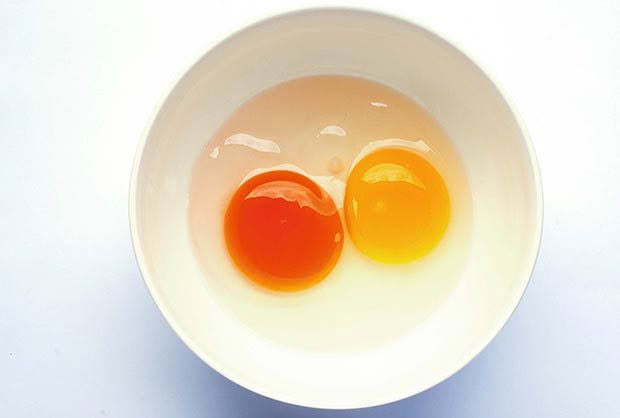How to bake lighter, fluffier cakes with duck eggs

A chicken’s yolk (left) and a duck’s yolk.
You can use duck eggs for any recipe that uses chicken eggs if you take a few things into account.
Words: Nadene Hall
Duck eggs are slightly bigger than your average hen’s egg, about 30% heavier, weighing in at about 70g on average versus around 50g for a hen. The shells are much thicker and they tend to be grey to off-white, but are often discoloured because a duck’s feathers and feet may be slightly dirtier. Don’t be put off by this though. So long as the egg is fresh and laid in a clean nest by a healthy duck, and collected within a few hours of being laid, then stored in your fridge, it will be safe to eat.
Don’t eat any that are excessively dirty, cracked or that have been in a hot place for too long. Duck eggs stored in your fridge last longer than chicken eggs thanks to their thicker shell, staying useable for up to six weeks. They are slightly harder to crack though.
COOKING WITH DUCK EGGS
Bakers love duck eggs. Their higher fat and protein levels mean cakes made with duck eggs tend to be lighter, fluffier, rise higher, stay moist for longer and have a better texture. Taste is subjective but most people note things like a richer flavour rather than a taste that they don’t like.
You can use duck eggs for any recipe that uses chicken eggs if you take a few things into account:
1. Replace chicken eggs for duck eggs by weight. For example, if a recipe calls for five chicken eggs (53-60g each, total 250g), you would use 3-4 duck eggs (70g or so, total 250g). The number of duck eggs you use will depend on their weight as some breeds lay heavier eggs than others so check before you add them to a recipe mix.
2. A duck egg is also slightly harder to whip up at first if you’re making meringues or pavlova because of the thicker albumen, but keep at it and once they froth, they do get there.
3. They can go rubbery if overcooked so be careful when frying them, and note you will not need to cook them as long as you would for a chicken egg.
4. If you want a beautiful ice cream or custard, the higher fat and protein makes for a much richer end result.
Love this story? Subscribe now!
 This article first appeared in NZ Lifestyle Block Magazine.
This article first appeared in NZ Lifestyle Block Magazine.
